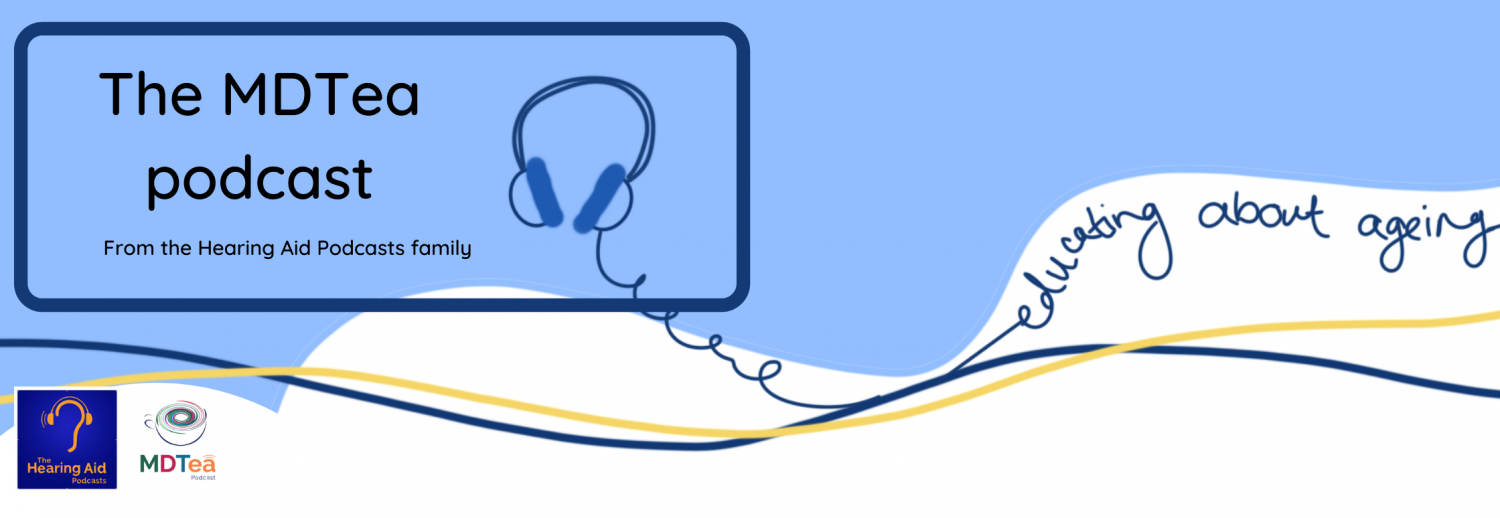12.6 Community Palliative Care
Presented by: Iain Wilkinson, Jo Preston and Stephen Collins
Special Guests: Sophie Bishop, Andy Carstairs, Rachael Findlay Geer, Laura Hanaghan, Eirian Levell, Paul Wogan (from St Wilfrid’s Hospice, Eastbourne)
Broadcast date: 4th October 2022

The MDTea Podcast is supported by the British Geriatrics Society
Learning Outcomes
Knowledge:
- To understand the breadth of roles involved with providing community palliative care, and to see how each of these staff interact to offer the best support possible to the patients under their care
Skills:
To learn the skills and specialist input provided by each different member of the community palliative care team, from nursing staff to OT’s to social workers and lots more.
To recognise the vast number of people who benefit from community palliative care and how the care and attention from the community team allow these patients to stay at home in their preferred environment for as long as possible.
Attitudes:
To show that palliative care can be, but is not always just, to do with end-of-life care.
To understand the incredible efforts made by palliative care staff to respond to the needs of chronically ill people in the community, and provide round the clock attention when called upon.
To see that the full multidisciplinary team are involved right from first contact with the palliative services, and that it takes the whole healthcare team to ensure that the patient is being provided for in the best possible way with all the support they need.
To recognise the crucial importance of palliative care within our healthcare system today.

Paper of the Week
Fritz, Slowther and Perkins, Resuscitation policy should focus on the patient, not the decision, BMJ (2017) – https://www.bmj.com/content/356/bmj.j813

Some facts about community palliative care
Timely identification of patients who are likely to be approaching the end of their lives, opens up opportunities to discuss, plan and organise care around a patient’s needs, wishes and preferences (eg preferred place of care or death, invasiveness of treatments attempted, needs of the patient’s loved ones) – https://spcare.bmj.com/content/early/2022/04/25/bmjspcare-2021-003066
Often people nearing the end of their lives can be cared for outside a hospital setting. Hospices, care at home teams and organisations such as Macmillan and Marie Curie can provide staff to visit patients at home when needs arise – https://www.nhs.uk/conditions/end-of-life-care/care-at-home/
Community palliative care can help all kinds of different patients, including (a) patients with rapidly progressive disease, (b) patients with difficult to control or rapidly progressing symptoms, (c) patients with distressing symptoms when no relief has been achieved within 48 hours, (d) people in psychological, social or spiritual distress in patients or their family, (e) young patients, or patients with young children in the family – https://www.wyevalley.nhs.uk/visitors-and-patients/county-hospital-(acute)/a-z-departments/palliative-care.aspx

How might the palliative care team help Jean?
Jean was referred by the Frailty hub to the hospice service due to her increasing frailty and her multiple chronic conditions.
She was triaged by the clinical nurse specialist team at the local hospice.
These members of nursing staff then went out and did a holistic review with Jean at her home, to establish what’s most important to her at the moment.
After assessing her, they gave Jean the 24/7 nurse line number, and asked her and her family to contact them if they ever had any needs, questions or concerns in the future.
A few months down the line, Jean’s family may choose to contact the hospice to receive further support from the hospice nurses, therapists and social worker, so that Jean can make the most of the later stages of her life.
Social Media this week...
Stephen: Brilliant piece by Stacey Finlay, who is an intermediate care sister and allied health professional representative for the BGS. She wrote an editorial for the RCNi (Royal College of Nursing institute) magazine entitled “It is not always kind to keep older people in bed”. And it’s well worth a read! https://rcni.com/nursing-older-people/opinion/editorial/its-not-always-kind-to-keep-older-people-bed-187146
Not going to lie, I'm a wee bit proud of myself today
— Stacey Finlay (@staceylou_18) August 2, 2022
August edition of @rcni Nursing Older People including my editorial and article on Frailty is out today.
I may be biased, but I think it's worth a readhttps://t.co/BMQ2hrYHnuhttps://t.co/sm5fuBJVJa@GeriSoc @RCNOPF pic.twitter.com/67eBDXfBYD
Curriculum Mapping
NHS Key Skills Framework
Core
Develop and maintain communication with people on complex matters, issues and ideas and/or in complex situations
Health and Wellbeing
Plan, deliver and evaluate interventions and/or treatments
Foundation Curriculum (Year One and Year Two)
1.2 Patient centred care
Works with patients and colleagues to develop individual care plans
2.6 Communicates clearly in a variety of settings
Works effectively within the healthcare team for the benefit of patient care
2.7 Works effectively as a team member
Acts as a member of the multidisciplinary professional team by supporting, respecting and being receptive to the views of other healthcare professionals
3.10 Recognises, assesses and manages patients with long-term conditions
Recognises frailty
Formulates individual patient management plan based on assessment of frailty as well as clinical need
3.11 Obtains history, performs clinical examination, formulates discharge planning
Liaises and communicates with the patient, family and carers and supporting teams to arrange appropriate follow up
3.17 Manages palliative and end of life care
Participates in discussions regarding personalised care planning including symptom management and advance care plans with patients, family and carers
GP Training Curriculum
Communication and consultation
Have appropriate communication skills for counselling, teaching and treating patients, their families and carers, and recognising the difficulties of communicating with older patients
Making decisions
Recognise the importance of a problem-based approach, taking in the ‘big picture’, rather than a disease-based approach to the care of older people, who often have complex physical, psychological and social problems
Clinical management
Ensure that the provision of care promotes the patient’s sense of identity and personal dignity, and that the patient is not discriminated against as a result of their age
Managing medical complexity
Understand how co-morbidity will influence the management of existing disease and delay the early recognition of adverse clinical patterns
Core Medical Trainee
- Common competencies:
Managing patient conditions and promoting patient self-care
Outline the concept of quality of life and how it can be measured
- Geriatric medicine competencies:
Understand the factors which influence health – psychological, biological, social, cultural and economic especially work and poverty
Internal Medicine Training Curriculum
Generic CiP3:
Communicates effectively and is able to share decision making, while maintaining appropriate situational awareness, professional behaviour and professional judgement
Geriatrics and Higher Specialty Training Curriculum
- Rehabilitation and Multidisciplinary Team Working
Roles and expertise of different members of interdisciplinary team
